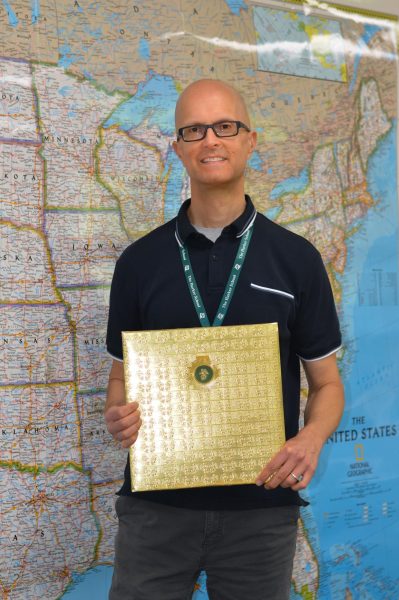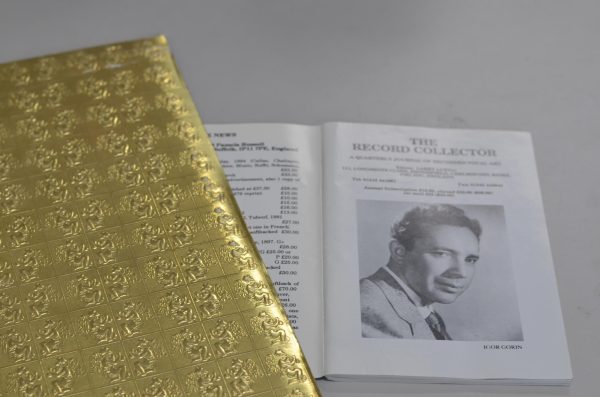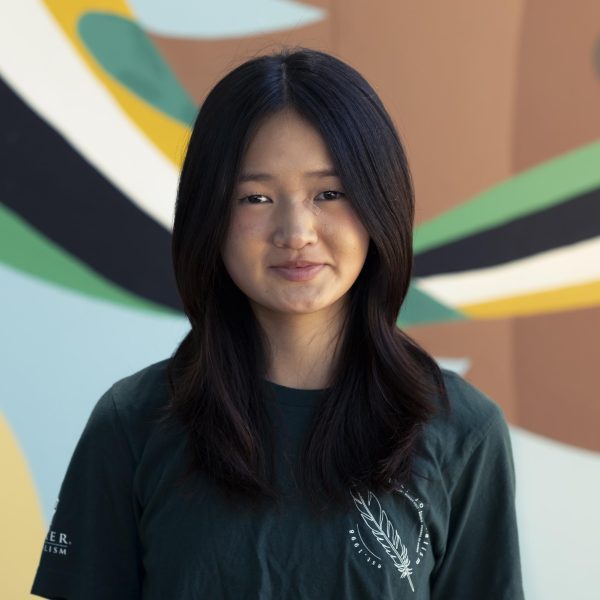
Music holds meaning. For some, it’s a source of energy. For others, it’s an escape from the raucous rhythm of reality. And for history teacher Dr. Witschorik, it’s a beacon of positivity where each chord elicits a smile and each lyric touches a heart. Driven by music’s power to uplift, he approaches each performance with a singular purpose: spreading joy.
Raised in the vibrant musical landscape of 1980s Chicago, Dr. Witschorik initially explored the decade’s pop music before discovering the allure of classic artists from the early 1900s — a period celebrated as the age of the Great American Songbook. Characterized by Broadway songs and jazz tunes, the Great American Songbook is often regarded as the birthplace of some of the most influential American pop and jazz songs. Dr. Witschorik explains the factors that drew him to the icons from that era.
“I gravitated to their music because it felt timeless,” Dr. Witschorik said. “I felt like their music was always relevant, beautiful, compelling and interesting, and the lyrics were often sophisticated and rewarded multiple listens. There was always something new that I could get from listening to a Barbara Streisand album, a Frank Sinatra song or an Ella Fitzgerald song.”
These generational artists largely inspired his interest in singing, a skill he began cultivating in graduate school and showcased through choir and solo performances. However, Dr. Witschorik was no stranger to the big stage. He played the saxophone from an early age, performing in his school’s marching band, jazz band and Wind Ensemble, a band specifically geared towards classical music. He recalls his initial interest in the instrument.
“The saxophone goes back even earlier in my life,” Dr. Witschorik said. “When I was in grade school, I had the chance to start learning an instrument, so I started with the saxophone because I just really loved the sound of it and it really seemed like a cool instrument to play.”
Dr. Witschorik also drew musical inspiration from his voice teacher’s teacher, Igor Gorin. Originally from Ukraine, Gorin fled the country due to rising antisemitism, received vocal training in Vienna and later came to the United States in the 1930s as a refugee. Dr. Witschorik commends Gorin as a talented musician and humanitarian and seeks to emulate his selflessness.
Across his various musical pursuits, Dr. Witschorik hoped that the gripping melodies and touching lyrics he performed could deliver a new note of positivity to others’ lives, the same way in which music brightened his own life. His goal of spreading joy through music inspired him to volunteer at Hospice, an organization that improves the quality of life of patients with six months or less left to live. Throughout his time with the organization, Dr. Witschorik has visited hospice recipients to share conversations with the patients and uplift them through his singing. Most of his best memories of singing come from the small moments when he was able to bring smiles to others’ faces.

“When I sing for people who mean a lot to me, like my students or my family or different communities that I’ve been part of, that’s what I really enjoy, because I feel I can bring a bit of happiness to folks,” Dr. Witschorik said. “I visit people and sing songs for them and that’s meaningful to me because I’m using whatever ability I have as a singer to hopefully brighten people’s day a little bit.”
His volunteer work speaks to his compassionate character, a fundamental aspect of who he is today. History teacher James Tate teaches AP U.S. History alongside Dr. Witschorik and similarly lauds his kindness.
“In some ways it’s a bit surprising for someone as meticulous and as organized as him to be so relaxed and personable,” Tate said. “He’s extremely genial. He’s lovely to speak with and lovely to work with. He’s amenable to suggestions and gives good suggestions of his own. He’s willing to give feedback and receive feedback and we have a great working relationship. I couldn’t ask for a better partner for teaching.”
Through cooperation with his colleagues and dedication to his students, Dr. Witschorik consistently seeks new ways to improve students’ experiences. He implements routine activities that serve as peaceful interludes in the midst of fast-paced APUSH lectures. Recently, he integrated a one-minute period after the class’s scheduled five-minute break where he performs a song suggested by his students. He explains the origins of this cherished tradition.
“I went to a workshop where we were encouraged to share a little bit more about ourselves as teachers,” Dr. Witschorik said. “And I thought, ‘Well, something that I do is sing and do music, so why not share that a little bit more with my students? So now I try to do that by taking requests and giving students the opportunity to share their music too. That’s been fun as well.”
His long-standing interest in history drives his teaching pursuits and desire for improvement as a teacher. Inside the classroom, he seeks to empower his students to be historical thinkers, to read against the grain and find meaning in their studies. Music serves as an important facet of history by transcending cultural boundaries.
“I find it really fascinating that a lot of American pop culture is a way that immigrants and the African American community fused together different musical styles into a style of tradition accessible to Americans to this day,” Dr. Witschorik said. “These songs have become known around the world. I find that the coming together of people from lots of different traditions and backgrounds through music to be a compelling and beautiful example of solidarity and cooperation.”


















![“[Building nerf blasters] became this outlet of creativity for me that hasn't been matched by anything else. The process [of] making a build complete to your desire is such a painstakingly difficult process, but I've had to learn from [the skills needed from] soldering to proper painting. There's so many different options for everything, if you think about it, it exists. The best part is [that] if it doesn't exist, you can build it yourself," Ishaan Parate said.](https://harkeraquila.com/wp-content/uploads/2022/08/DSC_8149-900x604.jpg)




![“When I came into high school, I was ready to be a follower. But DECA was a game changer for me. It helped me overcome my fear of public speaking, and it's played such a major role in who I've become today. To be able to successfully lead a chapter of 150 students, an officer team and be one of the upperclassmen I once really admired is something I'm [really] proud of,” Anvitha Tummala ('21) said.](https://harkeraquila.com/wp-content/uploads/2021/07/Screen-Shot-2021-07-25-at-9.50.05-AM-900x594.png)







![“I think getting up in the morning and having a sense of purpose [is exciting]. I think without a certain amount of drive, life is kind of obsolete and mundane, and I think having that every single day is what makes each day unique and kind of makes life exciting,” Neymika Jain (12) said.](https://harkeraquila.com/wp-content/uploads/2017/06/Screen-Shot-2017-06-03-at-4.54.16-PM.png)








![“My slogan is ‘slow feet, don’t eat, and I’m hungry.’ You need to run fast to get where you are–you aren't going to get those championships if you aren't fast,” Angel Cervantes (12) said. “I want to do well in school on my tests and in track and win championships for my team. I live by that, [and] I can do that anywhere: in the classroom or on the field.”](https://harkeraquila.com/wp-content/uploads/2018/06/DSC5146-900x601.jpg)
![“[Volleyball has] taught me how to fall correctly, and another thing it taught is that you don’t have to be the best at something to be good at it. If you just hit the ball in a smart way, then it still scores points and you’re good at it. You could be a background player and still make a much bigger impact on the team than you would think,” Anya Gert (’20) said.](https://harkeraquila.com/wp-content/uploads/2020/06/AnnaGert_JinTuan_HoHPhotoEdited-600x900.jpeg)

![“I'm not nearly there yet, but [my confidence has] definitely been getting better since I was pretty shy and timid coming into Harker my freshman year. I know that there's a lot of people that are really confident in what they do, and I really admire them. Everyone's so driven and that has really pushed me to kind of try to find my own place in high school and be more confident,” Alyssa Huang (’20) said.](https://harkeraquila.com/wp-content/uploads/2020/06/AlyssaHuang_EmilyChen_HoHPhoto-900x749.jpeg)



